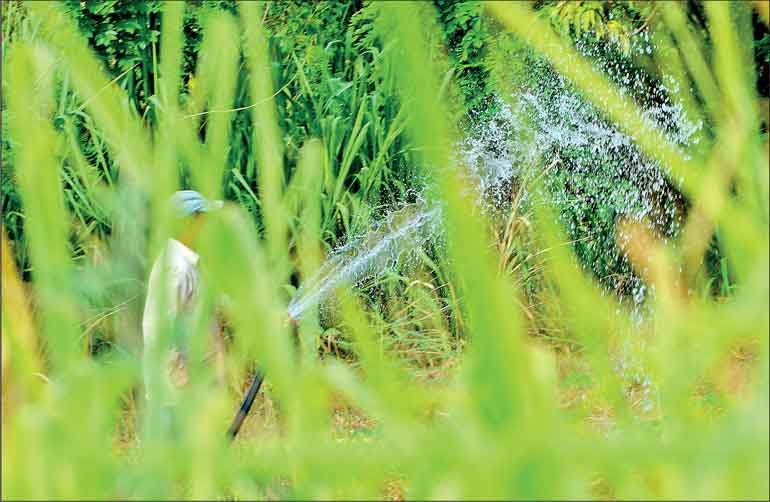Saturday Feb 21, 2026
Saturday Feb 21, 2026
Monday, 13 September 2021 00:00 - - {{hitsCtrl.values.hits}}

As a concept, organic agriculture has many benefits. However, unlike what has been portrayed, it is not simply a matter of reverting to ‘ancient practices’ – Pic by Shehan Gunasekara
Ever since April 2021, Sri Lanka’s agriculture and plantation sectors have been beset by needless difficulties as a result of an announcement, seemingly made on a whim, that Sri Lanka would switch to completely organic agriculture – effective immediately.
agriculture – effective immediately.
In doing so, the Government has jarringly halted all progress on efforts to develop these critical sectors, pushing the entire nation back many steps in the decision to ban import and use of all agro-chemicals and inorganic fertiliser.
A conflict of intentions and egos
By issuing such an extreme proclamation without a shred of scientific analysis into how these concepts could be practically implemented in Sri Lanka, they have done more harm than good to the expansion of true organic agriculture.
This is unfortunate because, as a concept, organic agriculture has many benefits. However, unlike what has been portrayed, it is not simply a matter of reverting to ‘ancient practices’. There is a deep and complex science to organic cultivation.
None of these complexities were understood or considered when the imprudent decision to ban all inorganic inputs was first announced. The assumption that ‘organic’ is just adding compost to soil has been the detriment of the directive. Hence, it was decided that imported chemical inputs were not necessary, not because organic agriculture is practical, but because imports require the Government to spend more of the nation’s now dwindling foreign reserves.
A little knowledge is a dangerous thing
In the months that have followed, everyone from academics to industry experts and farmers on the ground have been venting their frustration at the total breakdown of their regular cultivation practices as a result of this dangerously unscientific approach to agricultural reform.
After much condemnation, it was finally announced at the start of August that the Government was reverting their position. While not admitting it and maintaining that the ban is still in effect, probably to save face, the fact that they are relenting on import of chelated minerals, fertiliser mixes and micro-nutrients for specialist applications including for hydroponic cultivation and floriculture, even if temporary, is a slight relief.
It may be assumed that technicalities of what these terms mean may be enough to dissuade the public from asking too many questions. But anyone with passing knowledge of agriculture would understand that chelated minerals and fertiliser mixes contain the exact same inorganic inputs which the Government is overtly claiming to ban – namely: Nitrogen, Phosphorus, and Potassium (NPK). These are the elements which are essential to plant nutrition and growth.
Prior to the invention of techniques to produce synthetic fertiliser in the early 1900s, guano – the accumulated excrement of seabirds and bats was the only known reliable source of fertiliser with NPK suitable for commercial agriculture at that time. This pressing demand for fertiliser led to many predictions of mass starvation, and it would have come to pass were it not for the invention of the Haber-Bosch technique for the manufacture of synthetic nitrogenous fertiliser.
While it is possible to obtain Phosphorus locally, and organic Potassium could be imported from natural mines – leaving aside the fact that supply chains are not in place to meet the entire national requirement – sourcing Nitrogen is much more problematic. That is because it is extremely difficult to obtain N from plant or animal sources at the levels necessary for commercial scale agriculture.
Currently, we use Urea for tea and paddy, which contains approximately 46% Nitrogen. By contrast, organic sources like Gliricidia offers only 4%, while cattle dung has 3.5% and poultry dung –with 4.5% nitrogen by composition.
Prior to the ban, NPK was used in paddy, tea, rubber and coconut, and after the latest relaxation, these are still the same inputs that are being used, so in practice the Government has taken three months to make a bad decision and then reverse it – all the while falsely maintaining that inorganic NPK is not acceptable.
Had the Government simply consulted with relevant experts in the field in an open and transparent manner, they could have avoided all of the detrimental effects which followed from this disastrous decision. While they mention of a ‘Presidential Task Force for a green socio-economy’ at the outset, they have not been forthcoming about their logic or approach in any public forums.
We are aware that there is a person in that task force who has been presented as a professor who made the ludicrous claim that seaweeds as tall as coconut trees can be harvested from the ocean and used as organic fertiliser. While it is true that such large seaweed growth does exist, it is only found in close proximity to the North Pole, hence it is of no relevance to Sri Lanka. We offer this example in order to shine a light on the absurd and utter lack of credible scientific information behind policy decisions at the highest levels of this Government.
Those who fail to learn from history are doomed to repeat it
If we continue to allow the State to intervene and interfere with the fundamentals of agriculture in Sri Lanka based on the whims of such individuals, what is the worst that could happen? Previously we were told that the import and use of all agrochemicals would be banned immediately. Thereafter, the deadline was pushed back to a period within three months – one cultivation season. Now they have temporarily reverted back to allowing agro-chemicals, but it is implied that these imports could once again be banned at any moment.
In the interim, the solution that is currently being offered is a ‘nitrogen extract’ that will be used as a spray. No further details have been provided. We don’t know if this extract is organic, inorganic, from the moon or even Mars. All we do know is that the only possible high percentage nitrogenous extracts can only be obtained from a chemical base. If the Government is trying to deceive people, they may use chemically extracted nitrogen, which could in turn be sprayed on organic manure and distributed among farmers.
In effect, the Government is refusing to reveal what exactly we will be adding to our soil through such extracts. Until they do, we must continue to call for more clarity and transparency. This is especially crucial for any agricultural exports – especially tea – whose buyers are sensitive to Maximum Residue Limits (MRLs).
Another fact to consider: no country in the world has ever succeeded in going totally organic. There are however some cautionary examples from history of those who tried. The example of Bhutan has been often cited in recent months. There, it was announced that over a period of 20 years, Bhutan would systematically phase out inorganic inputs. Even after careful and intensive planning with broad stakeholder consultation and preparation, the country was only able to convert 10% of their arable lands into organic agriculture after 30 years of effort in total.
Another less well-known example is Cuba. With the collapse of the USSR, Cuba lost access to free or subsidised supplies of fertiliser. Given their trade blockades with the US, the island was forced to go organic. With all of their best effort and no other available options, they were only able to produce 20% of their food requirements, with the remainder having to be imported.
Globally of all the arable land available for commercial cultivation, 1.5% is presently organic. Out of that, 70% is pasture lands which do not require agro-chemicals as they are used for grazing of farm animals, whose excreta fertilises the soil. Together with natural microbes in the soil, and minute amounts of naturally occurring Nitrogen found in rain water, these pasture lands benefit from a steady release of nitrogen into the soil. With careful planning and agrostological management, it is possible to use these dynamics to supplement nutrition for commercial agriculture.
However, the best examples of these practices are found in Sri Lankan tea producing RPCs which through years of consistent effort and investment, created small organic zones for tea, which they utilise to supply limited demand in niche international markets.
However, collective demand for such products accounts for a fraction of Sri Lanka’s total tea production. This means that even if it were possible to convert the nation’s entire tea sector – and its smallholders – into organic tea, it would create a global oversupply, which would crash prices in these markets.
Exponentially adverse consequences
It is plainly and painfully obvious to every Sri Lankan that the decision to ban import and use of all agro-chemicals without any guidance, or feasible roadmap for farmers and all employed in the plantation sector was issued on a whim and without any plan whatsoever. As a result, this endeavour is doomed to fail. The consequences will be disastrous, and extremely difficult to reverse.
Through a single proclamation, this Government has intentionally compromised food production, and export performance in one fell swoop. This places the nation at risk of famine, and death from food insecurity. Even without the impacts of a fertiliser shortage – which will start to be felt from October, and get exponentially worse thereafter – Sri Lankans are already struggling to meet their daily needs. The Government is openly considering a return to the food rationing of the 1970s. What extremes will be required once food production and export crop yields drop to half of their current levels by 2022?
Sri Lanka cannot afford to find out. In order to save lives, and prevent the decimation of livelihoods, we call upon the Government to reverse their decision immediately. Do the sensible thing: lift the ban on imports of agro-chemicals.
(The writer is a former State Minister of Agriculture, Former Governor of the Southern Province, and Sri Lanka’s only PhD in Organic Agriculture from the Post-Graduate Institute of Agriculture at the Peradeniya University.)